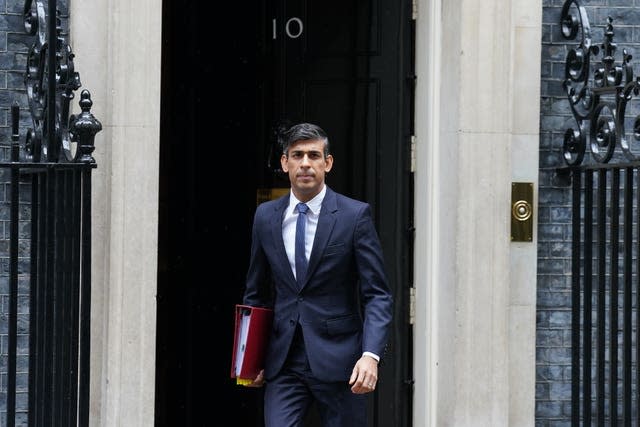UK working on getting trapped Britons out of Gaza as humanitarian crisis unfolds

The UK is working intensively to allow Britons trapped in Gaza to leave but the border crossing remains closed because of Egypt’s legitimate concerns, ministers said.
Immigration minister Robert Jenrick said opening the Rafah crossing to allow aid into Gaza and foreign nationals to escape the humanitarian crisis unfolding there is a priority.
A small convoy of 20 lorries was allowed to cross into Gaza on Saturday, with a further 17 reported to have made the trip on Sunday, but the UK and relief agencies are pushing for far greater access to the territory.

“We have secured, along with other partners, the supply of humanitarian aid through the Rafah crossing but not yet foreign nationals’ – including British nationals’ – ability to leave through the Rafah crossing,” he told the BBC.
But he said Egypt has “legitimate concerns” about the situation at Rafah.
Egypt has faced insecurity near the border with Gaza in north-eastern Sinai, including an Islamist insurgency which began more than a decade ago, although it has been largely suppressed.
Israel has ordered Gazans to move south as it carries out its retaliatory strikes on Hamas following the October 7 raids.
This has increased pressure at the border crossing, which has been largely closed since the Israel-Hamas war flared up.
Prime Minister Rishi Sunak, writing in the Sunday Telegraph, said: “We need to see a stream of trucks rolling through that crossing to bring aid to the civilian population.
“We also need to see all water supplies to Gaza restored where physically possible.

“All sides should commit to the sanctity of UN installations, hospitals and shelters.
“We’re working intensively with international partners to ensure that British nationals currently trapped in Gaza are also able to leave through this crossing while aid enters.”
Mr Jenrick said one of the problems with increasing aid to Gaza is the risk of Hamas taking the supplies, particularly if fuel is allowed in.
Seven fuel trucks are thought to have been among the vehicles entering Gaza on Sunday, something which is urgently needed for generators, including in hospitals.
“The good news is that the first aid has now gone through and I know that we have contributed to that by raising it at the very highest levels,” he told the BBC.
“We want to see much more because that’s just a welcome first step and we’re co-ordinating very closely with the United Nations.
“One issue is to ensure that Hamas don’t divert any of the supplies that are provided, particularly energy supplies, for their own activities, and that what does go into Gaza exclusively goes to support the innocent civilian population.”
The senior Palestinian diplomat in the UK has warned that a “humanitarian catastrophe” is unfolding in Gaza.
Husam Zomlot, head of the Palestinian mission to the UK, told Sky News’ Sunday Morning With Trevor Phillips programme: “Carnage, horror, in every sense, families have to make choices of should they leave, should they stay.
“Families are thinking of rationing water with children, which child can sustain more.”
Liberal Democrat leader Sir Ed Davey said the UK “should be leading international efforts to secure an immediate pause in hostilities”.
A “temporary humanitarian ceasefire” would allow for the hostages taken by Hamas to be released and for aid to get into Gaza, he said.
One of the biggest concerns among the international community is the prospect of the Israel-Hamas war spreading into a wider regional conflict.
Mr Sunak, who visited Israel, Saudi Arabia and Egypt this week, said: “The overwhelming view I got from everyone I spoke to this week was that we need to do everything possible to stop a contagion of conflict in the region.”
But as well as continuing to strike targets in Gaza, Israeli jets struck two airports in Syria and a mosque in the occupied West Bank allegedly used by militants.
Exchanges of fire with Lebanon’s Iran-backed Hezbollah militant group have occurred on a near-daily basis since the war began.
Lebanon’s ambassador to the UK, Rami Mortada, called on Israel to end its strikes on his country.
He told BBC Radio 4’s The World This Weekend: “The Lebanese side has been on the on the receiving end for the last 10 days.
“What we’ve been hearing is that no-one is interested in triggering a conflict but it would need the co-operation from all stakeholders mainly the Israelis, who have been in a provocative mood.
“So I think that if Israeli provocations and and attacks stop there is no reason why we shouldn’t be able to re-establish the 2006 cessation of hostilities.”
Tel Aviv’s ambassador to the UK, Tzipi Hotovely, told Times Radio the idea of a two-state solution for Israel and Palestine has “failed”.
She told Times Radio: “I think the two-state solution failed because Palestinians never accepted the idea of a Jewish state and you cannot carry on with a failed solution.
“And I also think that this is the time to rethink about a solution that will be better for everyone, so we won’t have a new terror organisation being established in the Gaza Strip after Israel finish the job with Hamas.”


